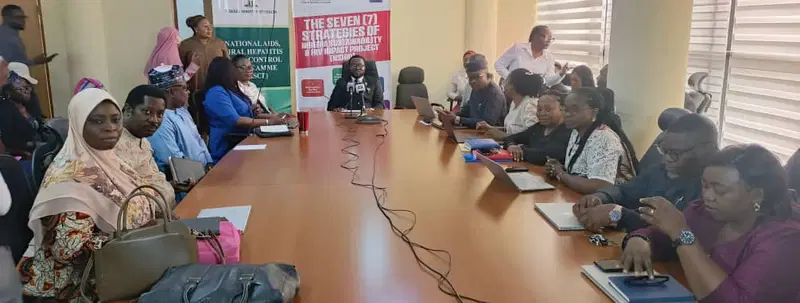
The National AIDS and STIs Control Programme (NASCP) has announced a significant milestone in Nigeria’s fight against HIV, revealing that over 90 per cent of identified HIV-positive pregnant women are now receiving antiretroviral therapy (ART).
The feat, officials said, is part of intensified efforts under the Prevention of Mother-to-Child Transmission (PMTCT) scale-up, which has helped reduce vertical transmission from 34 per cent in 2023 to 63 per cent in 2024.
Speaking at a news conference in Abuja ahead of the National HIV Health Sector Symposium, the National Coordinator of NASCP, Dr. Adebobola Bashorun, said the programme has made remarkable progress in closing treatment gaps and expanding access for vulnerable groups, particularly women and children.
“With sustained scale-up of PMTCT, Nigeria has reduced vertical transmission significantly. Over 90 per cent of identified HIV-positive pregnant women now receive ART to prevent mother-to-child transmission,” he stated.
Dr. Bashorun noted that the National HIV Health Sector Symposium, themed “Advancing PMTCT and Paediatric Treatment Coverage in Nigeria”, will spotlight ongoing innovations, policy reforms, and strategic partnerships aimed at boosting paediatric HIV response and maternal health outcomes.
He said the country currently has an estimated 1.9 million people living with HIV, with children accounting for 67,000—a notable drop of over 100,000 from previous figures recorded in 2023.
NASCP, he explained, has expanded the number of service delivery points (SDPs) from just 6,000 PMTCT sites to over 40,000 across the country, using the hub-and-spoke model to ensure pregnant women and children have access to HIV testing and treatment.
“The scale of expansion is historic. We are deploying point-of-care technology, including 85 mPIMA machines and an increase in GeneXpert platforms from 103 to 141 sites, which is improving early infant diagnosis and prompt ART initiation in newborns,” he said.
Dr. Bashorun added that NASCP has aligned its treatment approach with the World Health Organisation (WHO) recommendations by integrating child-friendly ART formulations such as DTG10mg and implementing multi-month dispensing to enhance adherence and retention in care.
He disclosed that plans are underway to introduce Tenofovir Alafenamide (TAF) into the programme, noting that paediatric ART coverage increased from 30 per cent in 2023 to 74 per cent in 2024.
The NASCP boss further highlighted the launch of the Paediatric Advanced HIV Disease (AHD) Package in six states—Gombe, Kano, Lagos, Rivers, Anambra and Benue—to reduce mortality in children with late-stage HIV through enhanced diagnostics, prophylaxis, and clinical mentorship.
Efforts to identify HIV-positive children through index testing of biological offspring of infected adults, he added, are now mainstreamed in supported states. Integration of paediatric HIV screening into reproductive, maternal, newborn, child, and adolescent health (RMNCAH), nutrition, immunisation, and tuberculosis clinics is also yielding results.
“Children and pregnant women remain our top priority in this response. We are committed to leveraging innovation, evidence-based practices, and collaboration with donors and partners to end paediatric HIV,” he assured.
Created in 1992 under the Federal Ministry of Health’s Department of Primary Healthcare and Disease Control, NASCP is mandated to coordinate the health sector’s response to HIV/AIDS, viral hepatitis, and sexually transmitted infections in Nigeria.
As the symposium opens, stakeholders expect a renewed focus on solutions that ensure no child is born with HIV and that all infected children and mothers receive timely, equitable, and effective treatment.